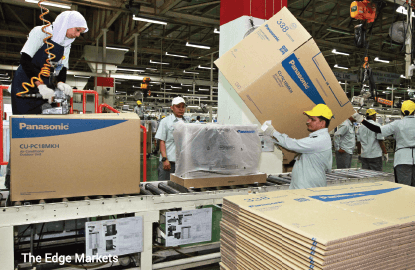
This article first appeared in The Edge Malaysia Weekly, on March 7 - 13, 2016.
The rebound in Nikkei Malaysia’s Manufacturing Purchasing Managers’ Index (PMI) came to a quick end with the index faltering to 47.8 points in February from 48.6 points in the previous month.
However, Malaysia was not the only Asian country to suffer weaker manufacturing output. According to Markit economist Amy Brownbill, China, South Korea, Taiwan and Indonesia too saw a decline in manufacturing output.
“Only the Japanese manufacturers signalled a slight expansion, although the rate of growth slowed closer to stagnation,” she tells The Edge in an email reply.
That said, compared with its Asian counterparts, Malaysia posted the biggest fall in production, says Brownbill.
What is even more unsettling is that according to the worldwide business surveys produced by Markit, only Brazil saw a steeper fall in manufacturing activity than Malaysia last month.
Malaysia’s PMI data began to show some improvement after November 2015, when the index hit a low of 47 points. It climbed to 48 points in December and 48.6 points in January 2016 before the rebound fizzled out.
Brownbill, who compiles the PMI data, explains that the main industries carrying the most weight in the index are chemicals, plastics and rubber, electronics and electrical equipment, as well as food and drink. She says the weight is based on the official value-added data sourced from the Malaysian statistics department.
Based on the PMI, any reading above 50 indicates overall improvement in the manufacturing sector’s operating conditions while anything below 50 signals a deterioration.
Markit points out that the February figure was below the long-run series average. The weaker data came on the back of poor domestic demand and a decline in total new orders, which led to a drop in production in the manufacturing sector.
“Incoming new work decreased for the 12th month running, although the rate of decline eased to its weakest since last May,” says Markit.
According to Brownbill, the weak domestic demand can be attributed to unstable economic conditions, the recent fall in oil prices and reduced global demand for goods ranging from palm oil to electronics, all of which is hurting the domestic economy.
Markit highlights in its PMI report that manufacturers also reported an increase in raw material cost due to the depreciation of the ringgit against the US dollar, alongside an increase in sales tax, which led to a further rise in input prices. This resulted in manufacturers raising the prices of their goods.
A recent separate survey of the business conditions of manufacturers, conducted through a collaboration between the Federation of Malaysian Manufacturers and the Malaysian Institute of Economic Research (FMM-MIER), does not paint a rosy picture either.
According to FMM-MIER, the six-month outlook for business is dimmer with the Business Conditions Index expected to slow to 94 points in 1H2016 from 95 points in 2H2015.
In the survey, manufacturers cite the weak ringgit as one of the domestic challenges this year as they compete with imports from China and experience poorer local demand caused by lower disposable income and higher inflation. They also consider the uncertainty about utility prices a key challenge.
“There was unanimous consensus that in terms of energy resources, the main challenges were an increase in and uncertainty about prices or tariffs, the supply of electricity and gas, and freight/transport cost,” says FMM-MIER.
Most of the respondents indicated that a weaker ringgit against the US dollar was the biggest challenge for them this year. “The ringgit’s depreciation has increased the cost of imports/raw materials and lowered sales revenue. Some, however, believe the weaker ringgit is good for exports,” says FMM-MIER.
Externally, manufacturers see the global, especially China, economic slowdown posing a big problem this year. “Other challenges are competition from China, South Korea, Thailand, Vietnam, emerging markets and Southeast Asia, depressed prices of oil and crude palm oil, foreign exchange volatility and price competitiveness,” says FMM-MIER.
The only positive that Malaysia’s Manufacturing PMI reported was an increase in new orders from abroad, a resumption of the trend seen at end-December 2015. The increase, says Markit, was the sharpest in four months.
“While the depreciation of the ringgit against the US dollar impacted manufacturers’ margins, it was beneficial for exports by increasing global price competitiveness,” it adds.
Nevertheless, Brownbill says the rise in exports in February compared with the previous month was “very modest”.
The modest increase provides a glimmer of hope for the country’s external trade statistics for February, which will be released in April. Economists had said that if exports fell short in the second half of 2016, it could signal a sharper-than-expected slowdown for the country.
According to the external trade statistics for January released last Friday by the Department of Statistics, exports shrank 9.4% to RM61.9 billion month on month and 2.8% to RM63.6 billion year on year.
The m-o-m decline was led by electrical and electronic products (-9.9%), liquefied natural gas (-15.7%), crude petroleum (-21.9%), palm oil and palm-based products (-6%), refined petroleum products (-2.1%) and natural rubber (-7.8%).
According to Markit, the PMI data in Malaysia, or other Asian countries, is unlikely to improve in the near future. “We expect the Malaysian manufacturing data to continue to show a weak trend in the next few months. The other Asian surveys indicate poor performance as well, which suggests that there are economic improvements that need to be made to help boost output. Note that global manufacturing is now stagnating, suggesting that the overall worldwide economic trend has deteriorated from late last year,” says Brownbill.
The JPMorgan Global PMI, which is compiled by Markit as well, sank to 50.6 points in February — the lowest level since October 2012 — from 52.6 points the previous month.


Save by subscribing to us for your print and/or digital copy.
P/S: The Edge is also available on Apple's AppStore and Androids' Google Play.